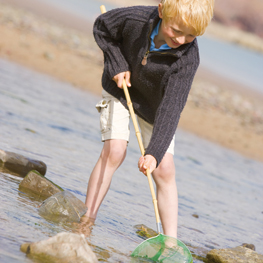
Kids love scavenger hunts. Tracking down clues with the promise of a prize can keep them going for hours. With a little time and a bit of planning, you can turn this afternoon activity into a weeks-long adventure that will engage your kids and their friends for the rest of summer. You can easily organize this game to work for kids aged six and over, and older kids may appreciate being able to head off to some activities on their own. The best thing is, a citywide scavenger hunt can be fun for you too.
Here are six easy steps to help you plan one successfully:
1. Decide who’s in the group. Aim for four to six kids and look at inviting several close friends or those who live in your neighborhood. You could also tap members of a book club or a scout troop. Make sure the parents are on board, as you’ll want to trade off who drives and supervises each activity.
2. Pick a prize. Will you have a treat after each event, or do you want to plan a big party when summer is over? Younger children may be more motivated by the promise of an immediate treat, while older ones may look forward to a bigger payout.
3. Identify your locations. Create a list with four categories of your choosing. Possibilities include local parks, museums, restaurants, trails, festivals, fountains and more. Include places and foods your kids are not familiar with so you can make trying new things fun.
4. Divide and conquer. Put the kids in charge of choosing which items on the list they’d like to see. Each child can choose one or two outings and work with a parent to make it happen. Keep in mind that you can pull from more than one list each time you get together. For instance, one day you may decide to have a picnic at a park and pick up lunch supplies from a store specializing in ethnic foods that are new to most of you. Or, you can hike on an urban trail that leads to a community fountain. Just make sure that you go to at least one place from each category before the game ends.
5. Develop clues. Look online or use your knowledge of local terrain to find things to hunt for. As an example, you could write a clue that asks everyone to find a certain statue at the park or a dish that uses a certain spice at a restaurant or a painting that features a snowy landscape at the museum. Collect reminders of the things you find. Paper menus, museum postcards and pressed flowers are just a few ideas of mementos to pick up.
6. Choose your dates. Most people have busy schedules in the summer, which means it will be difficult for you to require everyone to go on every outing. Instead, look for days when at least one or two others are available to go with whoever organizes the event. If you get more, consider it a plus.
By the end of summer, you’ll all be bursting with stories to share about the places you went and the things you experienced. This is when you may want to plan a party, and make sure everyone can attend. Plan time to gather together so you can talk about your game. Consider asking a few questions that everyone answers: “What new thing did you discover?” “What was your favorite activity?” “What would you do again?” “Is there anything you would leave off the list if you played again?”
Cindy plans activities for mother-daughter book clubs, Girl Scout troops and her family of four. Visit her at www.motherdaughterbookclub.com.
Calgary’s Child Magazine © 2024 Calgary’s Child